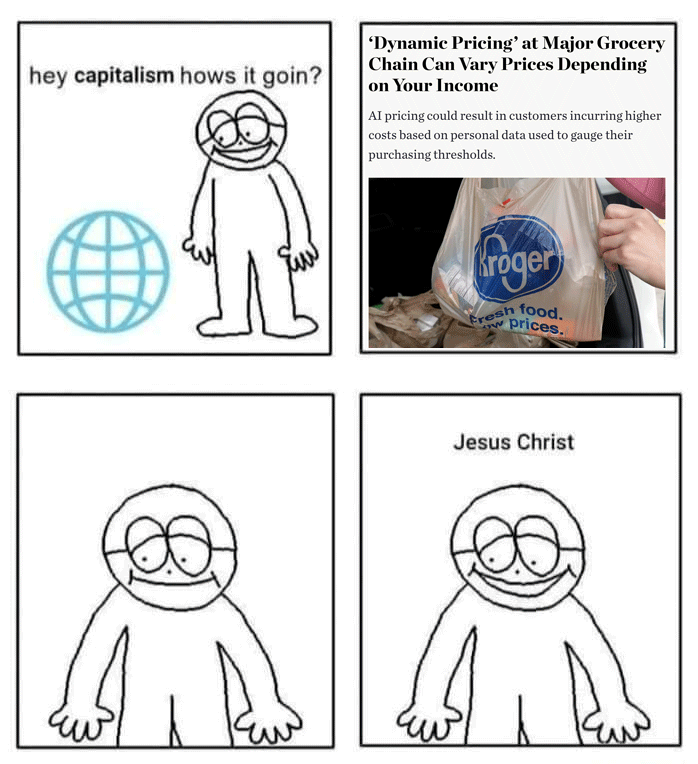In b4 we all start cosplaying as impoverished people to go grocery shopping.
"Cor blimey, guv'nor!"
If it would mean things getting cheaper for poor people, it wouldn't even be all that bad of an idea.
Well, except for the privacy issues, obv.
That's not what this kind of thing is. It's a way to bleed even more from those who don't have the option but to shop there.
Ya'll, this already happens - wholesale and retail pricing vs consumer pricing. This exact principle is why many states refuse sales tax - those disproportionately affect poorer people because a lot of rich people can buy items through their LLCs and get bulk or retailer pricing.
Costco has memberships based on this - there's the regular and then the executive memberships. You spend more on the higher level memberships (essentially an income check) and also get more money back later. Credit card promos function like this. Credit scores and loans function like this.
Grocery stores (capital) will never give us a break on food (money). They will always try to find a way to make the poor pay even more. That's why it's called capitalism - all that is valued is capital and capital accrues more capital. That's the game.
Costco, credit card promos, and loans are all opt-in, though; you have to initiate the transaction. You make the choice, you have some level of control (even if that is only walking away).
This, on the other hand, is making changes to a necessity that's offered to you based on something outside your control; you have no ability to control the transaction's decision, and you can't just walk away from buying food.
Yes, this is the game. But it's playing with people's lives; and whereas capitalism used to guarantee that companies would compete with one another to get prices as low as they could be, this AI "innovation"—coupled with the "not collusion, wink wink" of four megacorps controlling everything—means that something needs to be done. And it needs to be something more than just "shrug, capital gonna capital."
I recognize price controls would be a bit too much to hope for in this society, but demanding price transparency and equity seems like something we could actually manage.
The poverty line is a fucking joke.
The business model for many many many businesses is to give the rich a good deal to encourage more business, and to give the poor a mediocre to poor deal, because they have less options and the volume is lower.
I hate capitalism
A Boring Dystopia
Pictures, Videos, Articles showing just how boring it is to live in a dystopic society, or with signs of a dystopic society.
Rules (Subject to Change)
--Be a Decent Human Being
--Posting news articles: include the source name and exact title from article in your post title
--If a picture is just a screenshot of an article, link the article
--If a video's content isn't clear from title, write a short summary so people know what it's about.
--Posts must have something to do with the topic
--Zero tolerance for Racism/Sexism/Ableism/etc.
--No NSFW content
--Abide by the rules of lemmy.world
